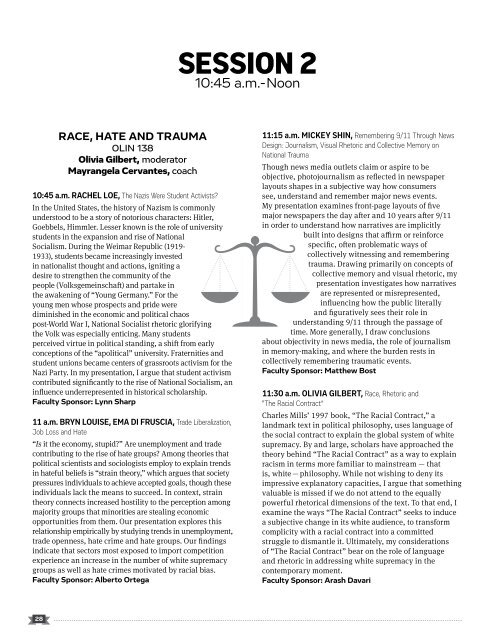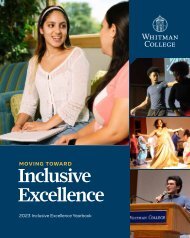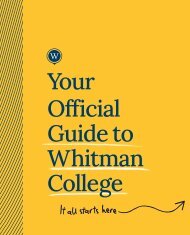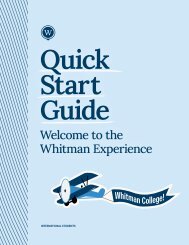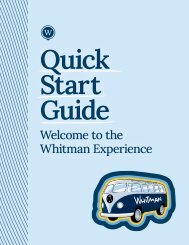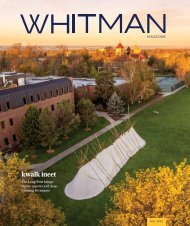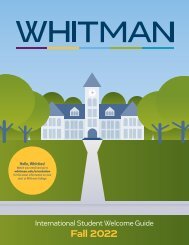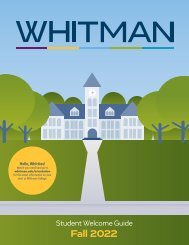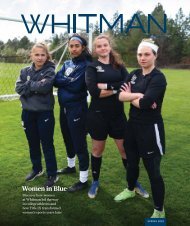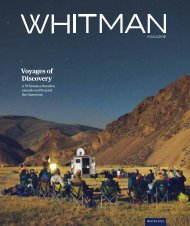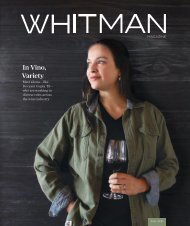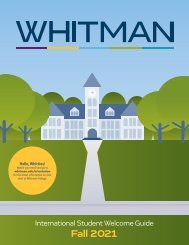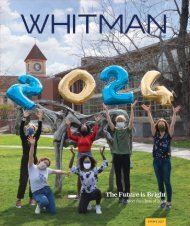You also want an ePaper? Increase the reach of your titles
YUMPU automatically turns print PDFs into web optimized ePapers that Google loves.
SESSION 2<br />
10:45 a.m.-Noon<br />
RACE, HATE AND TRAUMA<br />
OLIN 138<br />
Olivia Gilbert, moderator<br />
Mayrangela Cervantes, coach<br />
10:45 a.m. RACHEL LOE, The Nazis Were Student Activists?<br />
In the United States, the history of Nazism is commonly<br />
understood to be a story of notorious characters: Hitler,<br />
Goebbels, Himmler. Lesser known is the role of university<br />
students in the expansion and rise of National<br />
Socialism. During the Weimar Republic (1919-<br />
1933), students became increasingly invested<br />
in nationalist thought and actions, igniting a<br />
desire to strengthen the community of the<br />
people (Volksgemeinschaft) and partake in<br />
the awakening of “Young Germany.” For the<br />
young men whose prospects and pride were<br />
diminished in the economic and political chaos<br />
post-World War I, National Socialist rhetoric glorifying<br />
the Volk was especially enticing. Many students<br />
perceived virtue in political standing, a shift from early<br />
conceptions of the “apolitical” university. Fraternities and<br />
student unions became centers of grassroots activism for the<br />
Nazi Party. In my presentation, I argue that student activism<br />
contributed significantly to the rise of National Socialism, an<br />
influence underrepresented in historical scholarship.<br />
Faculty Sponsor: Lynn Sharp<br />
11 a.m. BRYN LOUISE, EMA DI FRUSCIA, Trade Liberalization,<br />
Job Loss and Hate<br />
“Is it the economy, stupid?” Are unemployment and trade<br />
contributing to the rise of hate groups? Among theories that<br />
political scientists and sociologists employ to explain trends<br />
in hateful beliefs is “strain theory,” which argues that society<br />
pressures individuals to achieve accepted goals, though these<br />
individuals lack the means to succeed. In context, strain<br />
theory connects increased hostility to the perception among<br />
majority groups that minorities are stealing economic<br />
opportunities from them. Our presentation explores this<br />
relationship empirically by studying trends in unemployment,<br />
trade openness, hate crime and hate groups. Our findings<br />
indicate that sectors most exposed to import competition<br />
experience an increase in the number of white supremacy<br />
groups as well as hate crimes motivated by racial bias.<br />
Faculty Sponsor: Alberto Ortega<br />
11:15 a.m. MICKEY SHIN, Remembering 9/11 Through News<br />
Design: Journalism, Visual Rhetoric and Collective Memory on<br />
National Trauma<br />
Though news media outlets claim or aspire to be<br />
objective, photojournalism as reflected in newspaper<br />
layouts shapes in a subjective way how consumers<br />
see, understand and remember major news events.<br />
My presentation examines front-page layouts of five<br />
major newspapers the day after and 10 years after 9/11<br />
in order to understand how narratives are implicitly<br />
built into designs that affirm or reinforce<br />
specific, often problematic ways of<br />
collectively witnessing and remembering<br />
trauma. Drawing primarily on concepts of<br />
collective memory and visual rhetoric, my<br />
presentation investigates how narratives<br />
are represented or misrepresented,<br />
influencing how the public literally<br />
and figuratively sees their role in<br />
understanding 9/11 through the passage of<br />
time. More generally, I draw conclusions<br />
about objectivity in news media, the role of journalism<br />
in memory-making, and where the burden rests in<br />
collectively remembering traumatic events.<br />
Faculty Sponsor: Matthew Bost<br />
11:30 a.m. OLIVIA GILBERT, Race, Rhetoric and<br />
“The Racial Contract”<br />
Charles Mills’ 1997 book, “The Racial Contract,” a<br />
landmark text in political philosophy, uses language of<br />
the social contract to explain the global system of white<br />
supremacy. By and large, scholars have approached the<br />
theory behind “The Racial Contract” as a way to explain<br />
racism in terms more familiar to mainstream — that<br />
is, white — philosophy. While not wishing to deny its<br />
impressive explanatory capacities, I argue that something<br />
valuable is missed if we do not attend to the equally<br />
powerful rhetorical dimensions of the text. To that end, I<br />
examine the ways “The Racial Contract” seeks to induce<br />
a subjective change in its white audience, to transform<br />
complicity with a racial contract into a committed<br />
struggle to dismantle it. Ultimately, my considerations<br />
of “The Racial Contract” bear on the role of language<br />
and rhetoric in addressing white supremacy in the<br />
contemporary moment.<br />
Faculty Sponsor: Arash Davari<br />
28


